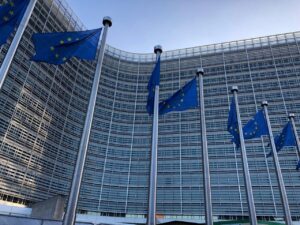I have previously published Polish government’s documents, that concluded that controversial pipelines from Russia to Germany should be a subject to EU legislation. This may reduce its harmfulness for Central and Eastern Europe markets or even – in case of Nord Stream 2 – block the construction. Poles’ new opinion confirms it – writes Wojciech Jakóbik, BiznesAlert.pl’s editor-in-chief.
In the text „Outlaw pipeline. Poland may torpedo Nord Stream 2” from 2015 I described a legal analysis prepared four years earlier for Donald Tusk’s government that clearly states that the existing Nord Stream pipeline from Russia to Germany should be a subject to EU’s legislation despite argumentation of followers of deliveries transport on this route.
Beata Szydło’s government prepared a new analyses that states exactly the same. According to Polish lawyers, the Third Energy Package that limits monopolies and could force Russia to change the legislation for the needs of building a new pipeline to Germany, that is Nord Stream 2, applies to investments on Baltic Sea. Poles also suggest a way of applying this law towards Nord Stream 2.
Polish lawyers say that the European Union has a right along its member states for jurisdiction in energy fields. The Third Energy Package should be applied directly for sea parts of Nord Stream 2 on territorial waters of EU member states. In this area, lawyers refer to International Court of Justice and the EU Court of Justice legislature. They also confirm that EU jurisdiction extents to exclusive economic zones.
On the Baltic Sea, Nord Stream 2 is supposed to be constructed on those. Lawyers give another examples of EU and international legislature. According to them, the member states on whose zone the pipeline will be built, are obliged to guarantee that the investment will be a subject to EU regulations. They admit that the third package does not apply to those parts of Nord Stream 2 that will be outside of EU jurisdiction and in order to change that, extending it outside of the EU would be necessary. Though there is something like exterritorial jurisdiction that allows applying EU law outside of EU jurisdiction if effects of not using it would bring effects on EU territory
– In this case, anti competition activities taken up by Russian companies from Gazprom Group and using Nord Stream 2 for such could obviously be banned and sanctioned according to EU competition laws – write the authors of the analyses. They also convince that there is „axiological rationale” for applying the Third Energy Package to Nord Stream 2 in order to fulfill the aims of those regulations. – Without applying the Third Energy Package regulations in Russian part of Nord Stream 2 pipeline, a possibility of applying particular Third Package regulations would face serious difficulties also regarding to the EU part of the Nord Stream 2 pipeline. This concerns especially Third Energy Package regulations about access of third sides to transmission networks, unbundling, operator’s certification and transparency of fee tarification for using the infrastructure.
– To make EU gas receivers able to use their right to choose the gas deliverer transported through Nord Stream 2 (according to the Third Energy Package regulations), it is first necessary to subjecting the Russian part of this pipeline to the Third Energy Package regulations on access of third sides to transmission networks – claim the authors.
If the European Commission listened to Polish lawyers, a deadlock in case of adaptation the Russian law to EU regulations could block the project. It is the only possibility of blocking it apart of rejection of optional EC-Russia deal by the European Parliament, what I wrote about for BiznesAlert.pl.
– Not applying the Third Energy Package to Nord Stream 2 pipeline would be even more incomprehensible if EC’s statement towards South Stream and Yamal Pipeline is not taken into consideration – the lawyers continue. In their opinion, precedences in those two investments prove that import pipelines from the third countries to EU should be fully a subject to the EU law.
Lawyers finish the analyses with an appeal for EU institutions. – Nord Stream 2 project undoubtedly influences EU’s energy security, especially Central and Eastern Europe countries. In this context, passiveness of EU institutions in applying the Third Energy Package regulations towards Nord Stream 2 pipeline would be a serious infringement of basic EU rules. Undertaking all necessary steps to realize EU energy policy is a duty of European institutions – they write.
Not to disfigure the message of this worth noting legal analyses, I publish its content in whole. It will be a precious element in a debate on this topic that will disallow to repeat part of arguments of defenders of Nord Stream 2 – an investment that may slow down the process of independence in several EU member states from Russian gas, harm market development and economic profitability of diversification projects, including Polish Northern Gate.
III Energy Package Applicability Analysis – Executive Summary
Third Energy Package legislation is directly applicable to the offshore part of the Nord Stream 2 gas pipeline that will be laid within the limits of territorial seas of EU Member States or on the bed or subsoil of EU Member States.
1. Under the Convention on the Law of the Sea, Member States enjoy regulatory prerogatives with respect to pipelines laid in their exclusive economic zones. In the event that submarine pipelines are laid in their exclusive economic zones and/or on the continental shelf, the Member States have the right to delineate the course and/or set out the terms for the laying of the pipelines and exercise jurisdiction over them under the rules specified in the Convention on the Law of the Sea.
2. Pursuant to the ECJ case law, the Treaties and the relevant secondary EU laws extend to the exclusive economic zone and the continental shelves of Member States in the event that a Member State takes actions which in light of the Convention on the Law of the Sea are categorized as a manifestation by the coastal State of its sovereign rights or jurisdiction in the territory of its exclusive economic zone or on its continental shelf.
3. Strong axiological arguments also exist to support the extraterritorial application by the EU of the provisions of the Third Energy Package to the offshore and onshore sections of the Nord Stream 2 gas pipeline located in the territory of the Russian Federation. Such axiological arguments include: the need to preserve uniformity of regulations with respect to Nord Stream 2 and the need to realise to the fullest extent possible the aims of the Third Energy Package.
4. No provision of the Third Energy Package contains language or argument to support the point that the Nord Stream 2 gas pipeline, in its part located in the territory of the EU, is not subject to the provisions of the Third Energy Package. This point is specifically not supported by the meaning of Article 36(1) in principio in connection with Article 2 point 17 of Directive 2009/73/EC. On the contrary, provisions of the Third Energy Package contain a number of specific regulations and provisions supporting the fact that transmission gas pipelines such as Nord Stream 2, or gas pipelines located only in one part of the territory of the EU (including those located in the territory of exclusive economic zones and on the continental shelf of EU Member States) are fully subject to the regulatory requirements provided for in the Third Energy Package in the territory of the EU.
5. The argument that says that since only intra-EU gas interconnectors i.e. gas pipelines connecting transmission systems of EU Member States may be subject to regulatory exemption under Article 36 of Directive 2009/73/EC and since transmission pipelines connecting a Member State with a Third Country are not eligible for such exemption, it therefore means that the latter gas pipelines are not subject to the provisions of Directive 2009/73/EC is incorrect.
6. It assumes first of all that the scope of applicability of a legislative act may be specified pursuant to regulations that provide for exemptions from some of the provisions of such legislative act. Such assumption is in fact entirely illogical and amounts to a complete reversal of the logical order of things under which first the scope of applicability of a legislative act needs to be laid down and then the scope of exemptions from the respective provisions of such legislative act should be specified.
7. Moreover, it is not so that Article 36 of Directive 2009/73/EC may be applied to all intra-EU gas pipelines. This provision may not be applied to all intra-EU gas pipelines, even if they cross borders between Member States; it is applicable only to gas pipelines which meet all the conditions for granting an exemption as spelled out in Article 36 of Directive 2009/73/EC. It should be noted at this point that, theoretically speaking, the Nord Stream 2 gas pipeline could be eligible for the regulatory exemption laid down in Article 36 of Directive 2009/73/EC, but only if its course was different from the one currently planned.
8. Failure to apply the Third Energy Package to Nord Stream 2 gas pipeline would be all the more incomprehensible given the European Commission’s position adopted with respect to the South Stream and the Yamal gas pipelines.
9. The most important legal consequence of the direct applicability of the provisions of the Third Energy Package to the section of the Nord Stream 2 gas pipeline located in the territory of the EU, including to the offshore section of the Nord Stream 2 gas pipeline located in the territory of exclusive economic zones and on the continental shelf of EU Member States, is the obligation resting on EU institutions and the Member States to fully implement all these regulatory requirements laid down in the provisions of the Third Energy Package with respect to the entire section of the Nord Stream 2 gas pipeline under the territorial jurisdiction of the EU.
10. Notwithstanding the above conclusions that the Third Energy Package is ipso facto directly applicable to the offshore part of the Nord Stream 2 gas pipeline, it can be inferred from EU legislation that EU institutions have a legal obligation to take any and all action to accomplish the aforementioned effect manifested in the application of the Third Energy Package provisions to the Nord Stream 2 gas pipeline by the EU. This legal obligation arises primarily from the fact that EU institutions must always take all possible measures in order to meet the objectives set out in the Treaties and in the secondary law enacted on their basis.
11. The Nord Stream 2 project undoubtedly affects the energy security of the EU, specifically of the Central and Eastern European countries. The project also has an adverse effect on competition, making the dominant position of Gazprom on the natural gas supply market in the EU even stronger. In view of this, the EU institutions’ passivity as far as the application of the rules of the Third Energy Package to Nord Stream 2 is concerned would be an obvious violation of the fundamental principles of the Energy Union. It is incumbent on EU institutions to take all necessary measures in order to carry out the EU’s energy policy.








